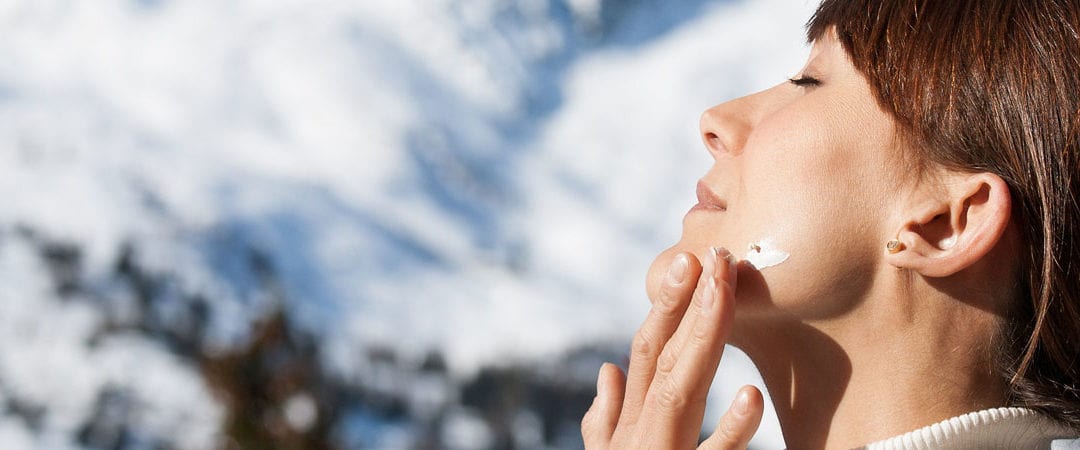The skiing season is in full swing, and your skin can easily suffer from all that mountain sun; or perhaps you have decided to escape from winter in the hot climes and are preparing for a beach trip. Wherever you are, a burnt face can easily spoil a vacation, but it is not the main issue with sunburn: excessive exposure to UV radiation is the primary cause of skin cancer. Melanoma and basal cell carcinoma have been on the rise in the last 50 years – nowadays, each person has a 1 in 50 chance to develop melanoma at some point in their life. The growing incidence of skin cancer is mostly due to our habit to spend lots of time in the sun uncovered getting a tan, as well as the widespread use of tanning lamps. Skin cancer can be deadly if not caught early.
Another reason to get good sun protection is photoaging. UV radiation is the key factor of premature skin aging, spots, and wrinkles. To preserve your health, youth, and beauty, you have to follow a number of simple tips. We have spoken to Jerry Xu, senior customer care specialist at Canadian Health&Care Mall canadianhealthcaremallrx.com – one of the leading online pharmacies in Canada – about how better to protect one’s skin from the sun.

1. Be reasonable
Jerry Xu: “The important thing to remember is that sun is actually good for you – up to a certain point. Unless you get some sunshine, your body will not produce the necessary amounts of vitamin D, and the deficiency of vitamin D can have serious consequences of its own, such as chronic fatigue and depression. Therefore, you need to spend time outside, and it’s not necessary to remain pale as a sheet. Everything is good in moderation.”
2. Learn the difference between UVA and UVB
We are more familiar with UVB rays – they damage our skin superficially and cause sunburn, as well as skin cancer. UVA penetrate much deeper into the skin and cause aging and wrinkles, as well as contribute to cancer. By the way, suntan itself (beautiful as it may be) is a sign of skin damage: your derma produces dark pigment melanin to protect itself against DNA damage.
3. Choose the right sunscreen
You should choose a sunscreen that protects from both UVA and UVB rays. As for the SPF factor, there is a lot of confusion out there as to what the numbers mean. Here’s what Jerry Xu says: “The SPF number is NOT the amount of UV radiation that the cream blocks. Rather, it relates to how fat you will burn when wearing the sunscreen. If it says 30, it means that it will take you 30 times more time to burn than if you were wearing no sunblock at all. Say you are very fair and normally burn in 20 minutes; then with SPF 30 you will burn after 30×20=600 minutes, or ten hours… as long as you keep reapplying the cream properly”. If you are fair-skinned and have red hair, or if you take medications that make you sensitive (some antibiotics, for example), choose SPF 40 or 50.
4. Be careful with reflected light
When on the beach or in the mountains skiing, it is not just the sun itself that can hurt you – the reflection off the water or snow can be just as damaging, since UV rays are reflected, too. Apart from your skin, make sure to protect your eyes by wearing sunglasses with a good UV filter. Don’t buy cheap sunglasses without UV protection! It may seem like you see just fine in them, but in fact they just make your pupils dilate, letting in more UV radiation and increasing the potential damage to your eyesight. Eye problems due to sun exposure are a real risk – for example, people who work on saltpans gathering shining salt in the glaring sun often go blind by the age of 50.
5. Wear a hat
Add some more protection by wearing a hat that shades not just your face, but also your neck and collarbones, which can burn badly. A hat will also protect your head from overheating, which can be a serious and even fatal condition. If you start feeling dizzy and unwell after spending time in the sun, make yourself a lukewarm bath and place a cold wet towel on your head. Drink lots of liquids – dehydration in the heat, especially in humid climate, can come unexpectedly and result in fainting and strong headache.
6. Avod the worst sun
Try not to spend time on the beach between 10 am and 4 pm, when the UV rays fall almost directly down and are the most dangerous. By contrast, early morning and late afternoon sun is very healthy. If you have to spend the whole day outside, make sure to reapply sunblock every couple of hours, wear sunglasses and hat. Use lipstick or lip balm that provides UV protection, preferably SPF 30.
7. Drink lots of water
Your whole body, including your skin, needs water, and when you are outside in the sun, this need is increased. As sunshine causes skin aging, water can prevent it by keeping your skin elastic and glowing. The normal amount of water is at least 1.5-2 liters a day, but in hot weather you should increase it to 2-2.5 liters a day. And this means real water, not just liquid (meaning that tea, coffee, soda, etc. don’t count) – your body metabolizes water differently from other drinks.
8. Take extra care when on medical treatment
Certain drugs used to treat high blood pressure, fungal infections, and inflammatory processes, as well as antibiotics, can make you burn easier. Chemotherapy, in particular, is known to make skin very sensitive to sun for up to a year after treatment. While most such drugs and treatment do not by themselves increase the risk of skin cancer, every additional sunburn episode does. Consult your doctor about going out into the sun. The healthy balance is to spend 15 minutes a day in the sunshine without sunscreen to get your vitamin D and cover up and use strong sunblock for the remaining time.
9. Eat an anti-aging diet
It is difficult to avoid photo aging completely, but you can reduce the risk by including antioxidants in your diet. They include vitamins A, E, and C, found mostly in fruit and vegetables and healthy oils (such as olive oil), nuts, and seeds. Make sure to eat at least 5 servings of fruit and veggies every day, as well as some nuts and fatty fish. However, don’t over do it: antioxidants do fight free radicals, which contribute to aging and diseases, but those free radicals have their role to play in the body, too. Research shows that too much antioxidants can actually increase the risk of cancer.
10. Your skin needs more than sunblock
Make sure to provide good nutrition, moisture, and protection to your skin at all times of the day – choose cosmetics, creams, and masks without parabens and preferably with natural extracts. The best way to nourish your skin is to use natural oils, such as argana, sweet almond, peach seed, and others. Essential oils should be added to the base oil mixture for additional benefit: such essences as geranium, bergamot, rosewood, and sweet orange can all slow aging and prevent wrinkles.
Protecting your skin from the sun can seem like a chore – indeed, it seems strange to avoid sun exposure when what you want is actually that beautiful bronze tan.
However, you should weigh the risks against benefits: is the tan that lasts a couple of months worth getting skin cancer that can put you in harsh therapy for years? And is that lovely beach look really worth the early wrinkles and brown spots that will never go away?
You may also like:



